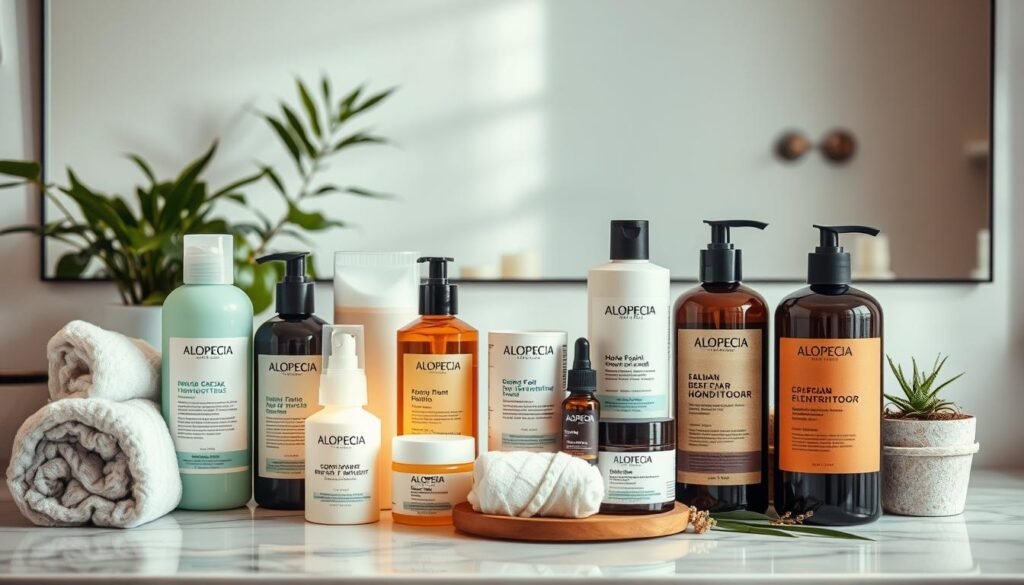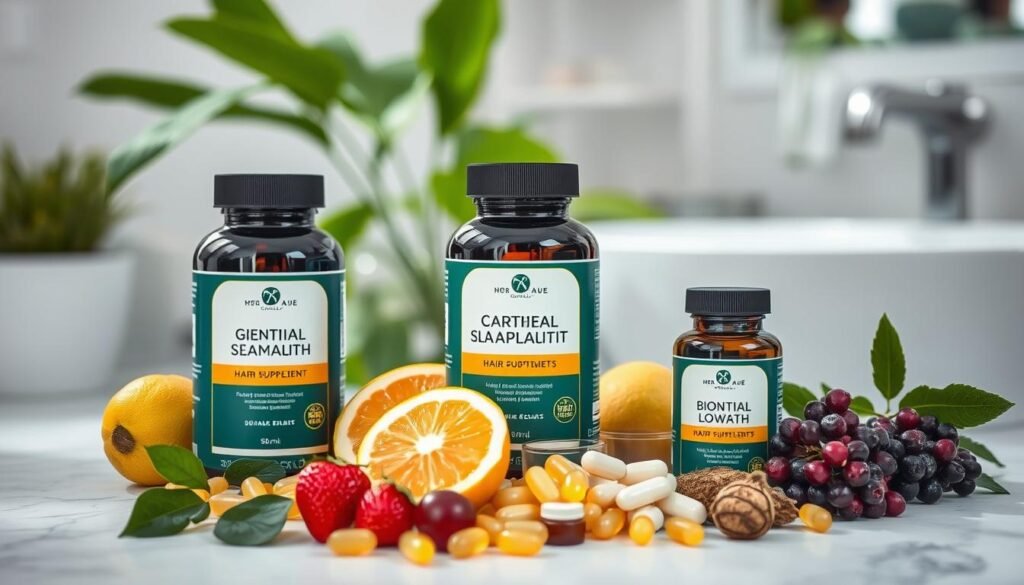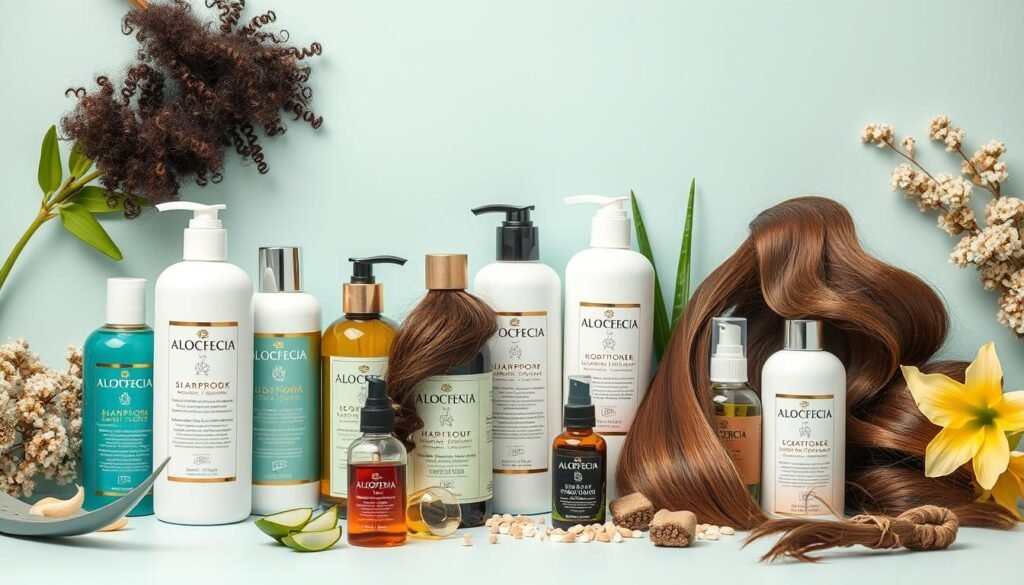About 50 million men and 30 million women in the United States deal with hair loss due to alopecia. This big number shows how widespread the problem is. Finding the right products is key to improving thinning hair. The market offers many shampoos for hair loss, conditioners, and scalp treatments. These products support scalp health and encourage hair to grow. We’ll look at the Top Products for Alopecia in this article. We’ll cover trusted brands that use biotin and caffeine to boost hair strength.
Finding the right alopecia treatment products for you can change how you manage hair loss. There are clinical and natural options. This article will help you learn about different ways to get healthier, fuller hair.
Key Takeaways
- Alopecia affects millions in the U.S., emphasizing the need for effective products.
- Shampoos and scalp treatments with biotin and caffeine can aid hair growth.
- Specific brands, like Briogeo and Paul Mitchell, offer popular solutions.
- Selecting the right product can lead to significant improvements in hair health.
- Understanding your unique hair type is essential in choosing the right treatment.
Understanding Alopecia and Its Impact
Alopecia is a condition that leads to hair loss. It includes types like alopecia areata, androgenetic alopecia, and telogen effluvium. Each kind has different alopecia symptoms. This makes knowing about alopecia key to handling it well. Alopecia areata usually causes sudden, patchy hair loss. Androgenetic alopecia results in a slower hair loss pattern. Telogen effluvium often happens because of stress or hormonal changes, causing more hair to fall out.
Different reasons can cause hair loss. Genetics is a big factor in androgenetic alopecia. Alopecia areata is often due to autoimmune responses. These causes show how complex hair loss is. They point out why people need treatments that fit their specific situation.
Hair loss affects more than just how we look. It can deeply impact how we feel about ourselves. Many people, particularly women, may feel they’re not meeting societal beauty standards. The National Alopecia Areata Foundation found that this condition can cause anxiety and depression. These emotional challenges add to the difficulties faced by those with alopecia.
It’s important to acknowledge the emotional side of hair loss. Doing so helps those affected and their loved ones support them better. Knowing about alopecia can guide people through their treatment choices. It also helps in creating a caring community for those dealing with alopecia.
What Are the Best Products for Hair Loss?
Searching for the right hair loss products can boost confidence and give a thicker hair look. There are many effective hair growth products now. They use unique ingredients aimed at various reasons for hair loss.
Experts think that products from creams to pills can really help. Minoxidil is a top solution known for making hair grow back. It works well for both genders. Finasteride is also praised for fighting androgenetic alopecia.
Pairing these with the right shampoos and conditioners is key. They have things like biotin, ketoconazole, and saw palmetto. These not just clean the scalp but help hair follicles stay healthy.
Recent studies show how good these products can be for stopping hair loss. For more details, check this in-depth guide on products and what users think.
With so many options, it’s important to read labels and know how each product works. Choosing wisely and sticking to a hair care plan can bring great results over time.
Top Products for Alopecia
Looking for good products to help with alopecia is important. You need to try different things like shampoos, conditioners, and scalp treatments. Each type helps in its own way. They meet the needs of your hair and scalp.
Shampoos for Alopecia
Shampoos made for alopecia help a lot. They have special ingredients like ketoconazole and biotin. These make your hair healthier and your follicles stronger. Using these shampoos cleans your scalp well. They also give your hair the nutrients it needs to fight off hair loss. Here are some top shampoos to think about:
- Nizoral Anti-Dandruff Shampoo – It fights fungi and cuts down on scalp flaking.
- Biotin Shampoo by Maple Holistics – Full of biotin, this shampoo makes hair thicker and less likely to break.
- Ultrax Labs Hair Surge Shampoo – This one has caffeine. It helps by getting your scalp’s blood moving, which is good for hair growth.
Conditioners That Support Hair Growth
Conditioners are very important for your hair. They help fix and feed your hair. Conditioners made for helping hair grow have special ingredients. These ingredients really help keep your hair hydrated and growing well. Here are some great ones to use:
- OGX Biotin & Collagen Conditioner – Makes your hair thick and full while keeping it moist.
- Aveda Invati Advanced Conditioner – Its natural recipe is made to make your hair stronger and thicker.
- Giovanni 2chic Avocado & Olive Oil Conditioner – This conditioner gives deep moisture. It also fights frizz for easier to manage hair.
Effective Scalp Treatments
Taking care of your scalp is key for hair that looks good. The right scalp treatments can wake up and boost your hair follicles. Let’s look at some popular choices:
- Thickening Hair Serum by Pura D’or – Uses oils and peptides to get blood moving better.
- Nutrafol Hair Growth Booster – This serum uses plant stuff to keep your scalp healthy.
- HairMax Hair Growth LaserBand – This device uses laser treatments to encourage hair to grow.
Top-Rated Alopecia Treatments You Can Trust
Many people who lose their hair seek effective treatments. They look for clinical products tested and proven to work. These products are a beacon of hope for those looking to bring back their confidence.
Clinical Products with Proven Results
To tackle alopecia, clinical-grade treatments are key. Some popular options include:
- Prescription topical solutions like minoxidil, helping both men and women grow hair.
- Platelet-Rich Plasma (PRP) therapy, which uses the body’s growth factors to help heal and grow hair.
- Finasteride, mainly for men, blocks hormones that make hair thin.
These effective treatments target various causes of hair loss. Talking with healthcare experts helps create treatments just for you. Knowing why you lose hair can boost your chances of getting it back.
| Clinical Product | Mechanism | Effectiveness |
|---|---|---|
| Minoxidil | Stimulates blood flow and revitalizes hair follicles | Effective for many users, especially with prolonged use |
| PRP Therapy | Utilizes growth factors from the patient’s own blood | Significant improvement reported in hair density |
| Finasteride | Inhibits hormone causing hair loss | Proven effective in preventing further hair loss |

Alopecia Remedies: What Works Best?
There are many ways to treat alopecia, including natural and medical methods. People often try low-level laser therapy. It can help hair grow. Medicines like corticosteroid injections are also important for managing symptoms.
Natural remedies are becoming more popular. They have fewer side effects. Essential oils, like rosemary and lavender, help strengthen hair. These natural options can be added to regular treatments, creating a full approach to tackling alopecia hair loss.
Understanding the success of these treatments means looking at the studies behind them. Below, you’ll find a table comparing common remedies and what they offer:
| Remedy | Type | Efficacy | Usage |
|---|---|---|---|
| Corticosteroid Injections | Medical | High | Administered by a healthcare provider |
| Minoxidil (Rogaine) | Medical | Moderate | Topical application |
| Low-Level Laser Therapy | Medical | Moderate | In-office or at-home devices |
| Rosemary Oil | Natural | Moderate | Regular topical application |
| Lavender Oil | Natural | Moderate | Regular topical application |
It’s key to talk to a doctor before trying any alopecia treatments. Each individual reacts differently, so customized plans are vital. For a closer look at effective alopecia remedies, check out comprehensive guides online, such as this one.
Hair Growth Supplements for Alopecia
Alopecia can lower confidence and self-esteem, leading many to look for solutions. Hair growth supplements are a popular choice among those seeking to boost their hair from within. These supplements are packed with vitamins and minerals that aid in hair growth and health.
Vitamins and Minerals Essential for Hair Health
Vitamins and minerals are crucial for keeping hair healthy. Key essential vitamins for hair health are:
- Biotin: This vitamin supports hair structure and follicle health.
- Zinc: Zinc helps with cell repair and regeneration, which is good for hair growth.
- Vitamin D: It plays a role in creating new follicles, which may reduce hair loss.
Adding these nutrients to daily supplements can greatly improve hair vitality. It may also prevent hair loss by addressing deficiencies. Look into recommended vitamins for hair growth for useful insights into effective products. These can show results in months.
Natural Supplements to Consider
There are also natural supplements for hair that can help. Many herbs are known for aiding hair growth. Popular choices include:
- Saw Palmetto: This herb might block a hormone that causes hair loss.
- Ginseng: Known for its revitalizing effects, it could stimulate hair follicles.
Natural supplements for hair provide potential growth benefits and fit well with holistic health views. If interested, talking to a healthcare expert is wise. They can offer advice on integrating these herbs safely into your routine.

Exploring Natural Remedies for Alopecia
Many people with alopecia look for safe, natural ways to fight it. They find hope in holistic treatments for hair loss. Acupuncture is one such method, known to improve blood flow to the scalp and boost hair growth.
Herbal treatments are also popular in battling alopecia. Ingredients such as saw palmetto and rosemary oil have been helpful in some studies. Even though there’s limited research, these natural options show promise when used consistently.
Eating right plays a key role in hair health. A well-balanced diet, rich in vitamins and minerals, helps a lot. Foods with omega-3s like salmon and chia seeds are especially good for hair growth. Alternative medicine experts also suggest supplements to improve scalp health.
Adding these natural remedies to your daily life could be a game changer. It’s smart to try different methods to see what works for you. Being open to new treatments could lead to great results.
Alopecia Treatment Options for Different Hair Types
Different hair types need unique alopecia treatments. It’s key to know how each hair texture reacts to treatments. This knowledge leads to better hair restoration.
Customized hair loss products and treatment plans are crucial. They ensure the best outcomes for individuals.
Coiled or wavy textures need moisture. Using products with hydration benefits can reduce dryness and breakage. But, straight hair types require light formulas. These help keep the scalp healthy without heavy residue.
Coarse hair likes thick, nourishing products. They help avoid damage and strengthen hair. Consistent care is important for hair integrity. Fine hair does well with products that boost volume and promote growth.

Choosing treatments means looking at your specific needs. Experts often suggest different products for different types:
- For Curly Hair: Moisturizing products with shea butter or coconut oil are best.
- For Straight Hair: Lightweight serums or sprays help avoid residue.
- For Coarse Hair: Look for nourishing options with proteins and oils.
- For Fine Hair: Scalp-stimulating, volumizing treatments are a good choice.
Getting advice from hair care professionals is a good idea. They can recommend the right hair loss products for your type. This ensures treatments work well and cover all bases in alopecia care.
| Hair Type | Recommended Products | Key Ingredients |
|---|---|---|
| Curly Hair | Hydrating Shampoo and Conditioner | Shea Butter, Coconut Oil |
| Straight Hair | Lightweight Serum | Argan Oil, Aloe Vera |
| Coarse Hair | Nourishing Creams | Proteins, Essential Oils |
| Fine Hair | Volumizing Shampoo | Biotin, Ginseng |
Choosing the Right Alopecia Hair Care Products
Picking the right hair care products is vital for managing alopecia. By being mindful in selecting alopecia products, one can improve their hair health. It starts with understanding the ingredients in products. Choosing ones without harsh chemicals is better for sensitive scalps.
Everyone’s hair care routine is different, highlighting the need to tailor to personal needs. The best hair care for alopecia often features shampoos and conditioners that nourish without heavy residues. It’s also important to think about how much hair has been lost to find the most effective products.
Tailored personalized hair loss solutions need input from experts like stylists and dermatologists. They provide insights on beneficial ingredients and special formulations. A well-rounded plan combines treatments and regular cleansing to encourage growth and keep the scalp healthy.
To wrap up, informed decisions on product ingredients and expert advice are crucial for dealing with alopecia successfully. Focusing on personal requirements helps set up a supportive hair care routine. This journey leads to the revival of hair vitality.
Conclusion
Dealing with hair loss means exploring different treatments that suit individual needs. This article showed the best ways to tackle alopecia. It covers everything from special shampoos to scalp treatments that work.
For best results, talking to a healthcare expert is crucial. They can recommend the right products and care routines. Tailoring a plan for your specific type of alopecia can be very effective as time goes on.
In the end, overcoming alopecia is about using the right products and having good support. Trying different methods and sticking to your care plan can make a big difference. This approach not only helps with hair growth but also boosts confidence.